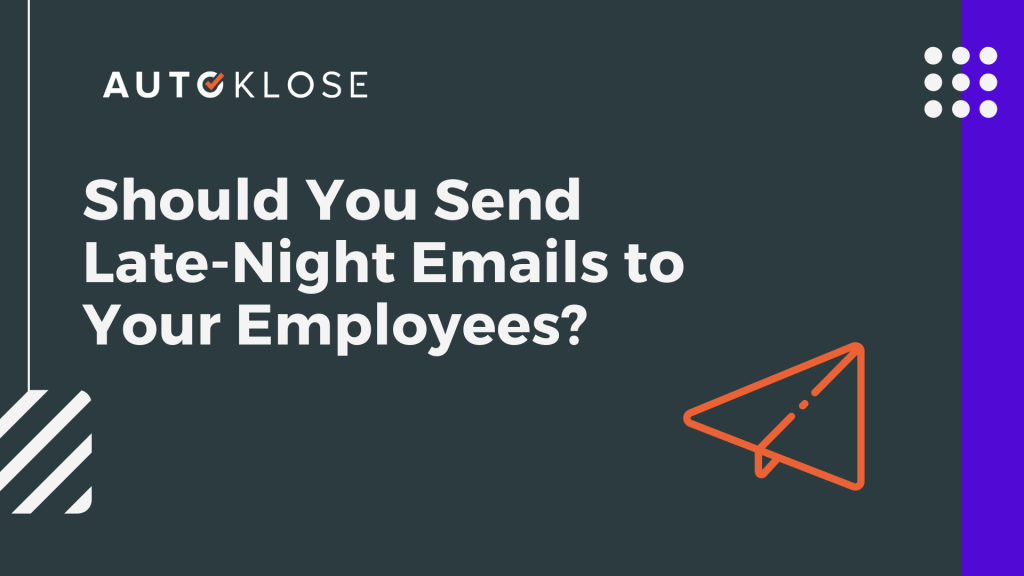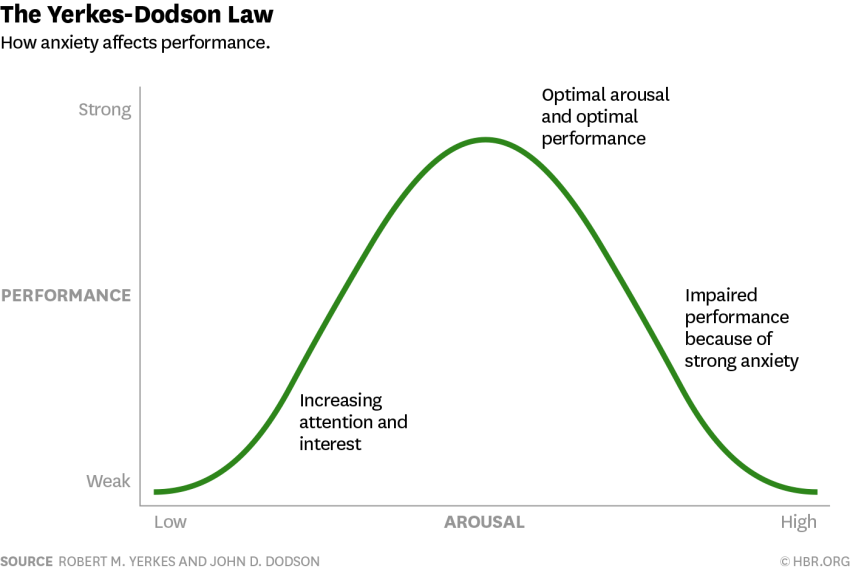
Elon Musk, Tesla’s hard-working CEO, sent an email last year, to his employees at 1:20 AM.
Many internet portals discussed this gesture and questioned how suitable and appropriate it was.
What’s even worse, the said email also announced that another series of job cuts was looming on large on the horizon.
Late night emails have been a sensitive issue for quite some time.
Soon, they might even become illegal too, at least in New York where the “right-to-disconnect” bill was introduced.
In case it’s passed, employees could turn to the city’s Department of Consumer Affairs to protect them from eager, overzealous managers who send emails at odd hours.
Shawn Finder, our CEO, again decided to ask his LinkedIn community about their take on this controversial topic.
- Cons of Sending After-Hours Emails
- Tips for sending late-night emails
- Pros of Sending Late-Night Emails
- 1. Handling emails doesn’t require too much mental energy
- 2. You might forget to communicate something important to your employees
- 3. Your employees and co-workers don’t have to respond immediately
- 4. You’re running an overseas team
- 5. Some people prefer reading emails in the evening
- 6. There’s an urgent situation which requires immediate action
- Community Feedback on Sending Late-Night Emails
The fact that it garnered more than 120,000 views and 85 comments in just hours after it was posted speaks volumes about how strongly people feel about late-night emails.

Cons of Sending After-Hours Emails
Let’s see why it’s a bad idea to reach out to your employees outside their regular hours.
The answer might be pretty obvious and self-explanatory, but the latest technologies and netiquette have challenged traditional business customs which means that we have to revisit and reassess them.
So, what are the cons of these after-hours emails?
1. Blue light exposure
All the devices that we’re surrounded by, such as laptops, smartphones, tablets, TVs emit so-called blue light which negatively affects your sleep pattern, and is linked to various diseases including obesity, diabetes, cancer, and heart disease.
This light interferes with your circadian rhythm and throws it out of balance, which means that you won’t be able to rest properly.
While any light wreaks havoc on your sleep habits, it’s particularly this blue light that suppresses the secretion of melatonin – a hormone responsible for your sleep-wake cycles.
According to a research study, the blue light reduces the release of serotonin for twice as long as the green light.
In other words, if you spend your evenings checking your emails and social media, you won’t be able to enjoy the benefits of good night’s sleep, as your body won’t produce enough melatonin; apart from that, circadian rhythm imbalance can increase blood sugar levels responsible for overeating.
The result?
The practice of sending and reading late-night emails will render you exhausted in the morning, while your appetite will go out of whack.
2. They put pressure on your employees
It’s after midnight, and your employees are most probably in their beds, trying to relax after a long day.
All of a sudden, the phones start dinging and flashing.
A new email from the boss! It must be something urgent since they decided to reach out at the wee hours of the morning.
Naturally, it’s hard to resist the impulse to see what the email is about.
Needless to say, the anxiety strikes as they open their inbox and find it flooded with new messages.
Even benign emails about the rescheduling of a meeting put pressure on your employees.
They feel as if they’re constantly being expected to sacrifice their personal time and think about work.
It’s only logical that business owners are invested in the growth of their company and ready to work around the clock, but it’s not fair to expect the same level of engagement from their employees.
3. Everybody needs to unplug and unwind
It’s essential to allow your employees to unplug and disconnect from work because that’s the only way for them to recharge and be ready for the new day or week at work.
It’s true that a certain amount of stress is beneficial for boosting productivity and improving performance.
According to the
However, this applies only up to a certain point.
When the stress threshold is reached, you can expect a decline in performance.
Moreover, a prolonged state of anxiety and stress results in burnout, that is the state of complete mental and physical depletion. To avoid this, it would be good to do some employee monitoring to see which team members work the hardest and whether there’s a risk of overworking.

The results of a recent Gallup study have shown that 23% of employees feel burned out at work often or always. This translates into $125 to $190 billion in health care spending.
4. They affect your team’s performance
All the above-mentioned psychological and health issues caused by the lack of sleep and relaxation add up and prevent your team from doing their best at work.
It stands to reason that if your employees are stressed out, tired, and exhausted, they won’t be able to meet
The same goes for you.
No matter how ambitious and driven you are, you still need at least 7 hours of sleep at night.
Yes, we all know Tesla himself never slept more than 2 hours a day, but this eccentric sleeping habit falls under the “don’t try this at home” category.
A study by the University of California, Berkeley, claims that sleep deprivation can affect your memory – it disrupts hippocampal function, and your “old” memories are overwritten by the new ones.
5.There’s a risk of miscommunication
Since you’re already tired and sleepy after a long day, your email might be error-ridden – your grammar and spelling might suffer.
It can also be difficult to make your point and explain what you want in a clear and comprehensive manner.
Similarly, those who decide to respond to your late-night email will be prone to the same mistakes.
In some cases, this whole confusion might even lead to drawing the wrong conclusion.
6. They won’t be read until the next morning.
Once your employees notice that you’re in the habit of disturbing them during the night with your messages, they’ll simply set their phones on silent mode.
Some of them will refuse to respond even if they see the message, only to express their refusal to be dragged into the work stuff when they’re at home.
We’re talking about open and response rates now, and it’s worth mentioning that emails sent between 6 and 7 A.M. and around 8 P.M. are most effective in terms of getting a response.
7. They Might Put You in an Unfavorable Light
There are certain situations in which sending a late-night email is justified, and nobody can blame you for wanting to send a message at midnight to inform your employees about an emergency.
But if you make a habit out of it, people can start questioning your personality or motives.
For example, someone can legitimately conclude that you don’t respect your employees’ private time. Even if they don’t check their business email at such odd hours, they will undoubtedly notice when you sent the message and start wondering if perhaps you expect them to be available and work long hours without being explicitly said so.
While it’s okay to be a workaholic and work long hours, sending your employees, late-night emails can be perceived as your way of subtly hinting that count on them to do the same. This can be frustrating and make your team members feel as if their hard work isn’t appreciated, as well as that they don’t meet your expectations.
So, before you decide to send your work emails at unusual hours, think about this or at least explain to your employees that you absolutely don’t expect them to be online, check their email, or respond even if they see that you have sent them a message at that time.
8. They might lead to unsubscribes
Your employees might have to put up with your untimely emails, but your prospects and customers surely don’t.
And guess what?
They will press that unsubscribe button and walk away from you.
So, instead of being inappropriate and sending emails to your customers at unusual hours, you should switch to automation.
Autoklose allows you to create and schedule your emails in advance.
You can pick the time and date for your campaign and forget about it.
And, if you follow our guidelines for creating the effective copy, converting subject lines, and irresistible CTAs, you can reduce the unsubscribe rate and increase your opens and click-throughs.
Tips for sending late-night emails
Before you hit that “Send” button, ask yourself some of the following questions:
- Is the message so urgent that it can’t wait for a more convenient time?
- Even if your employees or customers take action at the exact moment when they receive your email, will it change the outcome?
- Will your business suffer if the message is sent the first thing tomorrow morning?
- What time is it in your recipient’s time zone? While it might be 5 p.m, where you live, it’s equally inappropriate to send a message to someone who will receive it at 11 p.m.
- What will your employees or recipients think and how will they feel if you keep on sending them late-night emails?

Pros of Sending Late-Night Emails
Now that we listed all the bad things about this practice, it’s only fair to discuss its benefits.
1. Handling emails doesn’t require too much mental energy
According to this principle, you should do high-energy tasks when you’re rested and energized.
And handling emails isn’t one of them.
As a matter of fact, this activity is a low-energy task and should be dealt with after you’ve finished with demanding tasks, such as brainstorming sessions, giving sales demos, or having meetings with your clients.
And your hectic schedule usually doesn’t allow you to squeeze composing, sending, and reading emails during the regular business hours, so it’s only logical that you’ll do it later.
2. You might forget to communicate something important to your employees
The solution is to do it right away, no matter what time it is.
We’ve already discussed this, and although some would suggest that crafting a message, saving it in the draft folder, and sending it first thing in the morning, there’s a chance that you’ll forget to do it.
Again, Autoklose comes to your rescue with its advanced campaign management features.
To additionally make things easier for you, we crafted a number of email sequence templates for different business situations, so that you can just pick the one that you need, personalize and schedule it, and the rest is up to us.
3. Your employees and co-workers don’t have to respond immediately
It’s essential to clarify this and resolve this issue that might hurt your business relationship.
If you let your team know that it’s easier for you to send them emails when you have fewer tasks to attend to and that it doesn’t mean that you expect them to grab their phones in the middle of the night and obey your orders, they won’t feel guilty if they ignore your late-night email.
So, the main issue here is actually poor communication, and when you address all the potential issues and misunderstandings, you’ll prevent all that stress and anxiety which will be otherwise brewing in their mind.

4. You’re running an overseas team
As you may know, Autoklose’s headquarters are in Toronto, but a part of our team is situated in Europe, which means that we’re an ocean and 6 hours apart.
In other words, all of us receive emails and messages on Skype and Slack around the clock.
And that’s how things work when you’re running a remote team.
Nobody expects others to stay up all night and respond to messages.
But it would be too complicated if we had to wait for our colleagues across the pond to wake up in order to send them an email.
5. Some people prefer reading emails in the evening
If you have a lot of tasks to complete during the day, it can be hard to sit down and focus on your inbox.
That’s why some businesspeople like to handle their email correspondence in the evening, or even later during the night when they’re sure that nothing and nobody will interrupt them.
This allows them to focus and finish this task quicker.
Besides, let’s not forget that many people are night owls and that they perform much better when everybody else is sleeping.
6. There’s an urgent situation which requires immediate action
Crises happen, and sometimes it’s essential to reach your employees so that you can deal with it together.
Of course, you need to establish what counts as a crisis.
And it’s important to let your team know that they will be paid for their overtime work.
Community Feedback on Sending Late-Night Emails
Our LinkedIn audience had a lot of things to say about this matter.
Their opinions were mixed, and while some praised Elon Musk for his hard work and dedication to his cause, others said that sending emails late at night means that he doesn’t respect his employees’ privacy and off time.
A. It’s a wrong attitude
Nicholas K. believes that it’s not OK to impose your own work ethic on your employees and expect them to work around the clock only because you, as a business owner, do. Or as he puts it, “However, you can’t expect, and shouldn’t expect employees to hold the same kind of passion as he has. Employees are not shareholders and expecting that from them will only result in frustration on both ends. You cannot expect employees to be as dedicated as the owner. If you want that, then make them a part owner.”
Donna Angelico seconded this and added that “he is not improving his companies performance or morale with this memo, but the time he sent it is irrelevant.”
On the other hand, Keith Cerny stated that Elon Musk did the right thing because he clearly expressed what working for Tesla means and that all employees should be aware that they need to be highly driven and dedicated. According to him, “Anyone who works for Tesla knows that they are part of a mission and this is Elon being transparent about the challenges and difficult choices and reminding everyone.”
B. There’s nothing wrong with this approach
Aljaž Peklaj thinks that the fact that the said email was sent late at night doesn’t imply that Elon Musk expected his employees to respond right away. He also added, “I often work at 1 A.M. or 2 A.M.and send emails to my coworkers because I have something on my mind. This doesn’t mean I expect them to work so late.”
Matej Kolšek and Shawn Finder agreed with his point of view.
Ian Halliday – Pegg debated that, “ What does the time it is sent matter? He’s not forcing anyone to respond at that time. And with a global organization, it wasn’t 1 A.M. everywhere.
Tejiri Kodu added that, “ Most CEOs are up by this time and working.”
Tamás Kálmán agreed that it’s not a big deal. Here’s what he said “ Haven’t you sent an email to your coworker after work hours? I have. He sent an email out at 1 am. They read it when ever they have opened that mail. He did not knock on his employee’s door at 1 am. Now, that would have been more news worth it.”
Janos Szabolcsi agreed with the idea that CEOs have to work hard in order to grow their business and that it’s nothing unusual for them to send an email late at night.
C. The time difference argument
As Ashley Allard pointed out, “It’s not 1 A.M. everywhere at the same moment. When you have thoughts and ideas you get them out. It’s one thing if you respect/demand a response at that time. It’s another to share these thoughts the second they surface.”
Rory Baxter said that he always worked late and that “I have always worked best in the early hours and if I finish something at 2.00am I will send it off then in an e-mail. Obviously I don’t expect others to be working at the same time or to do anything with it until they start work at their usual time, but why would I hold back on sending it until normal working hours?”
D. There are email automation tools
Germán Goñi insisted that “There are a lot of tools to delay the delivery. It shows respect,” while Soriyath Straessle replied, “I think it is irrelevant: you are free to not check your (e)mails at any hour of the day and turn off your devices. With most of the newsletter sending their bulk emails at night time, how are you sleeping anyway?
E. The work-life balance argument
Charlene Friend admires Elon Musk’s work ethics but believes that balance is everything.
Adam Bright, on the other hand, said “Your idea of balance may be very different to many people…as I suspect is mine! I am lucky that when I am awake, I can be working, so i do, because it allows me to take that time off to enjoy something another day. That and I do enjoy my work, I am not sure I could work in a 9-5 environment! In fact I did once, and it was horrible!”
Perry Brill stated that “Patience is hard for CEOs or employees that just want a paycheck, but sometimes you just have to trust a leader and be involved in the risk-taking of your job for the greater good.”
Jack Joshlin offered an interesting notion that Musk “ is just trying to align his employee’s perception to his goals as an employer.”
However, Jason McCutcheon stressed the importance of work-life balance pretty straightforwardly and said “We are talking about human beings, Work life balance is a key part of the success in any organization. Burnout is a high-risk factor here!”
F. Email is the least intrusive channel of communication
While phone calls, SMS messages, and Skype calls can wake us up or disturb us, email is a pretty subtle way of delivering a message.
This is exactly what Kristy Court meant by “I’ve received 1:00 am emails, 3:00 am emails, all hours, even as a mother with very young children. And I appreciate this. Why? Because I’d much prefer an email that I will read at whatever time I log on to the network than an SMS that is likely to wake me.”
Cai Black points out that “It COULD just be that he sent it without the expectation that his employees would read until morning. That “do not disturb” function on the phone is useful for that. I send emails to my team at all manner of wacky hours. If they respond prior to 7 AM, I will respond with something like, “I wasn’t expecting a response until the morning.”
As you can see, the jury is still out on this one, but if you decide to keep the lines of communication with your employees open during the night, let them know that they don’t have to respond ASAP.




Leave a Reply
You must be logged in to post a comment.